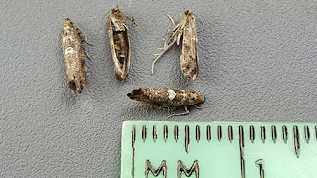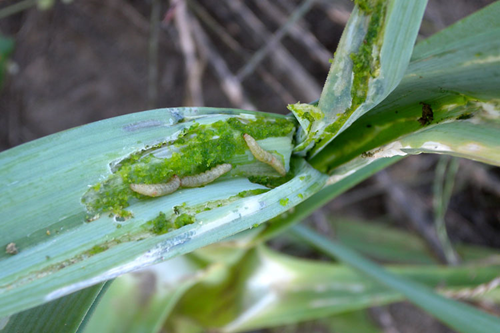The first Leek Moth of 2023 was trapped last week in Annapolis
Valley, this is a relatively new pest in Nova Scotia, first identified in 2017.
The moth is nocturnal so you may never see it unless you use pheromone traps,
but the Larvae can cause widespread damage to all parts of the plant and can be
difficult to control once established. The larvae will feast inside of onion
leaves, or in the stem of garlic or leeks making observation and subsequent control
difficult but dramatically reducing yield and marketability.
 |
| Adult leek moth. Photo: David Fuller, University of Maine Extension. |
This pest generally has two flights per year with the first in mid to late April depending on soil temperatures. This year’s flight will ramp up in the next week or two. The most effective control is insect netting or a physical barrier to prevent the moth’s ovipositor from reaching any part of your alliums (Lilies also serve as a host for you flower farmers out there). There are chemical controls; however, these are most effective when larvae are small and eggs are present and so monitoring is crucial to ensure correct timing. Please review our allium management guides for current control options.
 |
| Larval feeding damage on garlic. Photo: Agriculture and Agri-Food Canada. |
Perennia and Agriculture Agri-Food Canada (AAFC), with the support of the NSDA, have been trapping and monitoring Leek moths in Nova Scotia to develop models and further understand this new pest. The first flight occurs from overwintering moths when temperatures reach 9.5 ⁰C (mid to late April), the second flight occurs towards the end of June. Figure 1 below shows the Leek Moths caught in pheromone traps during 2020 and 2022, you can see that there is a general trend of two flights; however, the exact timing changes each year. With the recent investments in weather stations across N.S we hope to turn this data into predictive GDD models so that you can be alerted before any Leek Moths have been trapped!

